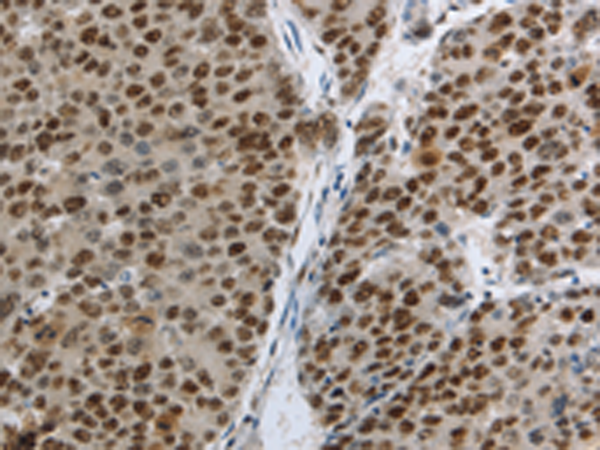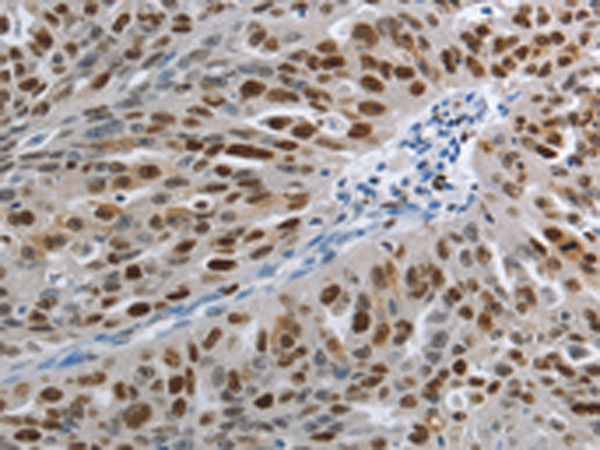


| WB | 1/500-1/2000 | Human,Mouse,Rat |
| IF | 咨询技术 | Human,Mouse,Rat |
| IHC | 1/50-1/200 | Human,Mouse,Rat |
| ICC | 技术咨询 | Human,Mouse,Rat |
| FCM | 咨询技术 | Human,Mouse,Rat |
| Elisa | 1/1000-1/5000 | Human,Mouse,Rat |
| Aliases | HCC5, P1.h, RLFB, P1-MCM3 |
| WB Predicted band size | 91 kDa |
| Host/Isotype | Rabbit IgG |
| Antibody Type | Primary antibody |
| Storage | Store at 4°C short term. Aliquot and store at -20°C long term. Avoid freeze/thaw cycles. |
| Species Reactivity | Human, Mouse |
| Immunogen | Fusion protein of human MCM3 |
| Formulation | Purified antibody in PBS with 0.05% sodium azide and 50% glycerol. |
+ +
以下是3篇关于MCM3抗体的参考文献摘要整理:
---
1. **文献名称**: "Minichromosome Maintenance Protein 3 is a Prognostic Marker for Colorectal Cancer and Predicts Patient Survival"
**作者**: Li X, et al.
**摘要**: 该研究通过免疫组化分析结直肠癌组织中MCM3蛋白表达,发现MCM3高表达与肿瘤分期、转移及患者生存率降低显著相关,提示其可作为结直肠癌预后标志物。
---
2. **文献名称**: "MCM3 as a Novel Diagnostic Marker for Urothelial Carcinoma"
**作者**: Gupta R, et al.
**摘要**: 研究比较了MCM3抗体与Ki-67在膀胱尿路上皮癌中的诊断效能,发现MCM3在检测细胞增殖活性方面敏感性更高,支持其作为更优的肿瘤增殖标志物。
---
3. **文献名称**: "Dysregulated Expression of MCM3 in Oral Squamous Cell Carcinoma and Its Clinical Implications"
**作者**: Wang Y, et al.
**摘要**: 利用免疫印迹和免疫荧光技术,发现口腔鳞癌中MCM3蛋白异常过表达与肿瘤侵袭性及患者术后复发风险密切相关,提示其可作为治疗靶点。
---
如需获取更多文献细节或具体实验方法,建议通过PubMed或Web of Science平台检索DOI或PMID进一步查阅。
The MCM3 (Minichromosome Maintenance Complex Component 3) antibody is a tool used to detect the MCM3 protein, a critical member of the MCM2-7 helicase complex essential for DNA replication. This hexameric complex, conserved across eukaryotes, binds to replication origins during the G1 phase of the cell cycle and unwinds DNA during the S phase. MCM3. specifically, plays a structural and regulatory role in assembling the complex and ensuring replication fidelity. Its expression is tightly linked to cell proliferation, making it a biomarker for actively dividing cells.
Research using MCM3 antibodies has revealed its overexpression in various cancers, including prostate, ovarian, and colorectal carcinomas, where it correlates with poor prognosis. These antibodies are widely employed in techniques like Western blotting, immunohistochemistry (IHC), and immunofluorescence (IF) to study cell cycle dynamics, tumor proliferation indices, and replication stress responses. In diagnostics, MCM3 detection helps distinguish malignant tissues (high MCM3) from benign or non-proliferative lesions.
The development of specific MCM3 antibodies has also advanced understanding of replication licensing mechanisms and their dysregulation in diseases. Recent studies explore its potential as a therapeutic target, particularly in cancers reliant on unchecked DNA replication.
×